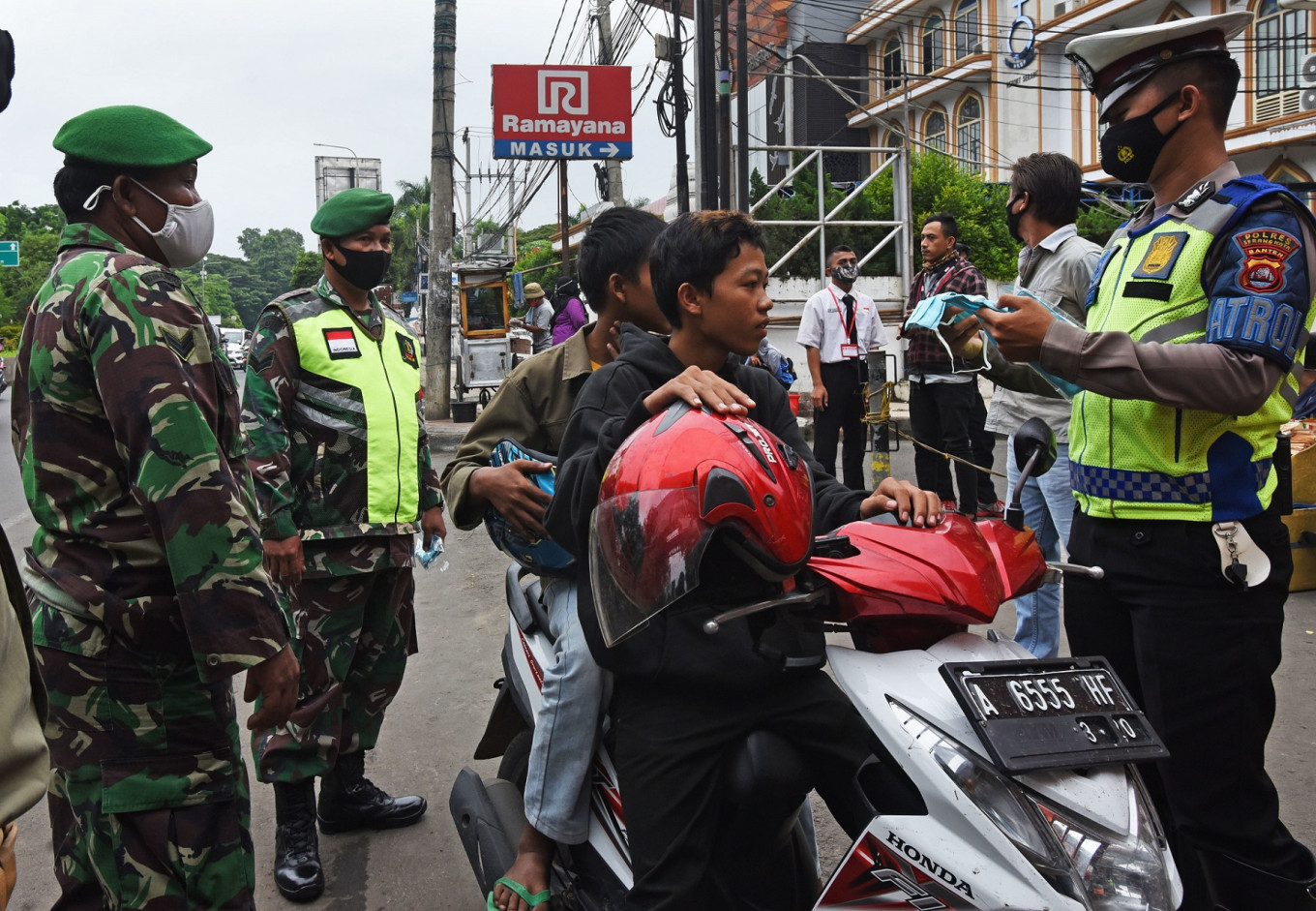Popular Reads
Top Results
Can't find what you're looking for?
View all search resultsPopular Reads
Top Results
Can't find what you're looking for?
View all search resultsTNI, police to have greater role in COVID-19 prevention efforts
Move dubbed one of largest nonwar operations in Indonesia’s history
Change text size
Gift Premium Articles
to Anyone
I
ndonesia plans to deploy tens of thousands of security personnel both to enforce COVID-19 restrictions and trace the contacts of patients in what is being called one of the largest non-war operations in the country’s history.
President Joko “Jokowi” Widodo said previously that his administration would involve the military, the police and public order (Satpol PP) officers in the effort to contain the outbreak.
Coordinating Economic Minister Airlangga Hartarto, who also helms the national economic recovery and COVID-19 response team, said the officers would be deployed in support of the government’s micro-scale public activity restrictions (PPKM Mikro).
“We’re involving the military, the police and Satpol PP officers at the local level, not only for [health protocol] law enforcement but also for contact tracing,” Airlangga said.
Under the latest restrictions, neighborhood units (RT) and community units (RW) – the lowest levels of city administration – are required to enforce the restrictions that best suit their level of risk. Local officials and security officers are required to perform COVID-19 surveillance, trace the contacts of patients, monitor self-isolating residents and facilitate testing.
In RTs considered at the highest risk – where COVID-19 cases have been found in at least 10 households over the previous seven days – neighborhood officials and security officers must close public areas and places of worship, ban gatherings and enforce curfews.
The minister added that local restrictions would involve the Indonesian Military’s (TNI) village supervisory non-commissioned officers (Babinsa) and the National Police’s security and public order officers (Bhabinkamtibmas).
According to a 2018 Army Chief of Staff Regulation, Babinsa are responsible for supplying information for non-war military operations, such as in response to natural disasters, because of their connection to and knowledge of local conditions.
Bhabinkamtibmas are assigned at the village or subdistrict level to act as advisors on security and public order concerns.
Read also: Indonesian Military deployed for coronavirus fight
TNI commander Air Chief Marshal Hadi Tjahjanto said nearly 30,000 Babinsa and non-commissioned officers from the Navy and Air Force would be assigned as COVID-19 contact tracers in the hardest hit villages and subdistricts of Java and Bali – about half of the 57,415 active Babinsa.
The officers will be deployed after they finish a training program run by the military’s health center and the Health Ministry.
National Police chief Gen. Listyo Sigit Prabowo said the police would assign 40,366 Bhabinkamtibmas for contact tracing, kompas.com reported. According to a 2018 report, the police have around 50,000 Bhabinkamtibmas out of 430,000 active officers nationwide.
Epidemiologists have criticized the government for its poor COVID-19 detection record. Both testing and contact tracing have been severely lacking.
Health Minister Budi Gunawan Sadikin said the number of contacts traced ranged between two and four per COVID-19 case found in the country, a fraction of the international standard of 30 contacts per case.
Daily new cases hovered around 8,500 over the past week, and as of Saturday, Indonesia had confirmed 1.27 million cumulative COVID-19 cases and 34,316 deaths.
The government has imposed several sets of restrictions in efforts to slow down COVID-19 transmission, including PPKM Mikro. But President Jokowi recently said the restrictions were “not effective” because of widespread health protocol violations. He urged an increase in the presence of law enforcement to ensure public compliance with health protocols.
Muradi Clark, a military defense expert from Padjadjaran University in Bandung, West Java, said the move to involve Babinsa as COVID-19 contact tracers was inevitable and expected because of their logistical and structural capability to provide swift support.
“They can create a deterrent effect that encourages people to adhere to the strict health protocols,” Muradi said.
He added that the 2004 TNI Law and the 2002 Police Law provided legal avenues for military and police personnel to be deployed for non-war operations, such as in support of civil authorities for disaster relief and to provide humanitarian aid during disasters.
Read also: ‘Wrong’ strategy brings Indonesia closer to 1 million COVID-19 cases
However, Institute for Security and Strategic Studies (ISESS) cofounder Khairul Fahmi said that if Babinsa’s containment efforts worked, it might only be because the officers used public terror or fear to enforce restrictions.
Khairul added that the public’s low level of compliance with health protocols might elicit a repressive or violent response from security personnel. “Having military personnel in COVID-19 tracing efforts might lead to potential abuses against society.”
Khairul said the psychological state of military personnel involved in the operation might be similar to that of civilians with limited knowledge of the disease, as they might be anxious about getting infected. This, he said, could decrease the effectiveness of health protocol enforcement.
University of Indonesia epidemiologist Pandu Riono said contact tracing should be performed by trained medical workers instead of security personnel, who would “scare people off, causing people to tend to lie about their health condition.”










